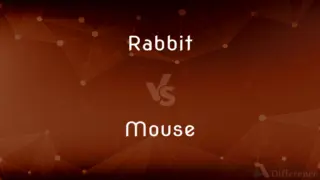Astonished vs. Shocked — What's the Difference?
By Tayyaba Rehman & Maham Liaqat — Updated on May 3, 2024
Astonished implies a sense of amazement or great surprise, often positive, while shocked suggests a more intense, often negative reaction to an unexpected event.

Difference Between Astonished and Shocked
Table of Contents
ADVERTISEMENT
Key Differences
Astonishment often carries a connotation of being pleasantly surprised or impressed by something, where the unexpected nature of an event brings about a sense of wonder. For example, one might be astonished by a surprise birthday party or an unexpected personal achievement. This emotion tends to be associated with delight and is less likely to overwhelm the individual emotionally. In contrast, being shocked typically implies a strong emotional response to something startling, disturbing, or offensive. It often involves a degree of disbelief and may carry a negative connotation. For instance, one might be shocked by a sudden, tragic news event or by behavior that starkly violates societal norms. Shock can be more jarring and distressing, potentially leading to a state of disorientation or upset.
While astonishment can involve a brief moment of surprise followed by admiration or joy, shock might lead to longer-lasting impacts on one's emotional state, sometimes requiring time to process and recover from the initial response. Astonishment might cause someone to gasp or smile, whereas shock might result in a person freezing in place or expressing dismay.
Both reactions share elements of surprise, but the contexts and consequences differ significantly. Astonishment is more about unexpected pleasure or wonder, enhancing one's experience positively. Shock, however, often involves unexpected dismay or horror, potentially leading to stress or discomfort.
The way people use these terms can also reflect the intensity of their experience. Saying one is astonished often invites sharing in a joyous or intriguing revelation, while declaring shock might prepare listeners for something more serious or disturbing.
Comparison Chart
Connotation
Often positive
Generally negative
ADVERTISEMENT
Intensity
High but delightful
Higher and more distressing
Duration
Brief, with lasting positive regard
Longer, with potential distress
Emotional Response
Surprise mixed with joy or admiration
Surprise mixed with dismay or horror
Context Usage
Pleasant surprises, impressive feats
Disturbing, offensive, or tragic events
Compare with Definitions
Astonished
Feeling wonder or admiration in response to something.
He was astonished at the complexity of the mural.
Shocked
A strong emotional response to something unpleasant or unexpected.
The community was shocked by the unexpected closure of the local school.
Astonished
A reaction to something unexpectedly positive or impressive.
The audience was astonished by the magician's skill.
Shocked
Indicates a more severe reaction compared to general surprise.
The nation was shocked by the leader's abrupt resignation.
Astonished
Indicates a high level of surprise without the connotation of trauma.
I was astonished to see my painting in the gallery.
Shocked
Often associated with negative surprises.
He was shocked to discover the extent of the betrayal.
Astonished
Often associated with pleasant surprises.
They were astonished to find their friends had thrown them a surprise party.
Shocked
Caused to feel horror, disgust, or dismay.
She was shocked by the news of the sudden accident.
Astonished
Surprised greatly; amazed.
She was astonished by the unexpected applause she received.
Shocked
Can involve elements of trauma or emotional disturbance.
The witness was shocked into silence by what she saw.
Astonished
To fill with sudden wonder or amazement.
Shocked
A violent collision, impact, or explosion, or the force or movement resulting from this
The shock of the explosion blew out windows of every building on the street.
Astonished
Amazed; surprised.
Shocked
A sudden feeling of distress
The shock of the news has not yet worn off.
Astonished
Simple past tense and past participle of astonish
Shocked
The sensation and muscular spasm caused by an electric current passing through the body or a body part.
Astonished
Filled with the emotional impact of overwhelming surprise or shock;
An amazed audience gave the magician a standing ovation
I stood enthralled, astonished by the vastness and majesty of the cathedral
Astounded viewers wept at the pictures from the Oklahoma City bombing
Stood in stunned silence
Stunned scientists found not one but at least three viruses
Shocked
A sudden economic disturbance, such as a rise in the price of a commodity.
Shocked
A shock absorber.
Shocked
A number of sheaves of grain stacked upright in a field for drying.
Shocked
A thick heavy mass
A shock of white hair.
Shocked
To surprise and disturb greatly
We were shocked by his admission of wrongdoing.
Shocked
To induce a state of physical shock in (an animal or person).
Shocked
To subject (an animal or person) to an electric shock.
Shocked
To administer electric current to (a patient) to treat cardiac arrest or life-threatening arrhythmias.
Shocked
To administer electroconvulsive therapy to (a patient).
Shocked
To come into contact violently, as in battle; collide.
Shocked
To gather (grain) into shocks.
Shocked
, startled, confused, or taken aback, particularly when also indignant.
Shocked
(medicine) Suffering from shock.
The patient is shocked.
Shocked
(physics) Affected, altered, or transformed by one or more shock waves.
Shocked quartz
Shocked
Subjected to electric shock.
Shocked
Simple past tense and past participle of shock
Shocked
Struck with fear, dread, or consternation
Common Curiosities
Can someone be both astonished and shocked at the same time?
Yes, complex events might evoke both astonishment and shock, depending on the aspects of the situation.
Is it more common to use "shocked" in serious contexts?
Yes, "shocked" is typically used in contexts involving unpleasant or upsetting revelations.
Can the use of astonished ever be appropriate in a negative context?
While less common, it can be used negatively if the surprising element has mixed outcomes or implications.
What are some synonyms for astonished and shocked?
Astonished: amazed, astounded, stupefied. Shocked: horrified, appalled, dismayed.
Is recovery from shock typically longer than from astonishment?
Yes, because shock involves more distressing emotions, it generally takes longer to process and recover from.
What is the main difference between astonished and shocked?
Astonished often implies a positive reaction to surprise, whereas shocked suggests a negative and more intense emotional response.
How do the physical reactions to astonishment and shock differ?
Astonishment might cause a person to smile or laugh in surprise, while shock might result in a stunned silence or visible distress.
How do authors use these emotions in literature?
Authors might use astonishment to enrich positive plot developments and shock for dramatic, often negative twists.
How do astonishment and shock play into human survival instincts?
Both can heighten awareness and prompt a more vigilant observation of one's surroundings, potentially as a protective response.
What kind of news might astonish versus shock a person?
Winning an award might astonish someone, while an unexpected death might shock them.
How do astonishment and shock affect storytelling?
These emotions can drive the narrative, creating pivotal moments that engage the audience's attention and emotional investment.
How do cultural differences affect the perception of these emotions?
Cultural norms can influence what is considered surprising or shocking, affecting how individuals react to different events.
Can repeated exposure lessen the impact of shock or astonishment?
Yes, familiarity with certain types of news or events can reduce the intensity of both shock and astonishment over time.
What are practical ways to deal with shock in a healthy manner?
Techniques might include talking to someone, engaging in calming activities, or seeking professional help if the emotional impact is severe.
How might a psychologist describe the effects of being shocked?
A psychologist might describe it as a trigger for acute stress reactions or a potential precursor to longer-term psychological impact, depending on the severity and the individual's resilience.
Share Your Discovery

Previous Comparison
School vs. Campus
Next Comparison
Rabbit vs. MouseAuthor Spotlight
Written by
Tayyaba RehmanTayyaba Rehman is a distinguished writer, currently serving as a primary contributor to askdifference.com. As a researcher in semantics and etymology, Tayyaba's passion for the complexity of languages and their distinctions has found a perfect home on the platform. Tayyaba delves into the intricacies of language, distinguishing between commonly confused words and phrases, thereby providing clarity for readers worldwide.
Co-written by
Maham Liaqat











































